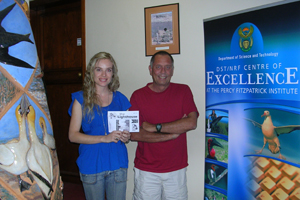Half-century milestone for the Fitztitute
08 February 2010 The institute's protection programmes for rare and threatened birds in Africa include a project on the conservation biology of Ludwig's Bustard (Neotis ludwigii). This bird is near-endemic to Southern Africa, and thought to be in decline because of mortality caused by collisions with overhead power lines. These birds are particularly susceptible to collision because they are large and heavy, and lack manoeuvrability.
The institute's protection programmes for rare and threatened birds in Africa include a project on the conservation biology of Ludwig's Bustard (Neotis ludwigii). This bird is near-endemic to Southern Africa, and thought to be in decline because of mortality caused by collisions with overhead power lines. These birds are particularly susceptible to collision because they are large and heavy, and lack manoeuvrability.
The year 1960 heralded a pivotal decade, marked by counterculturalism and the Cold War. John F Kennedy was elected US president after a narrow contest against Richard Nixon, Soviet Sputnik 5 launched two dogs into space, and the first oral contraceptives were made available. It was an interesting global climate in which to launch UCT's Percy FitzPatrick Institute of African Ornithology.
Five decades ago phrases such as 'global warming' and 'mass extinctions' were not part of the layman's lexicon. A brief 50 years later, both phrases have become watch points for massive ecological changes, harbingers of poverty, disease and mass extinctions, all of which highlight the institute' s critical mitigating role in conservation research and capacity-building.
The institute's name carries its own story, borrowed from Sir Percy FitzPatrick – author of another African classic, Jock of the Bushveld – by the institute's creator, Fitzpatrick's granddaughter, the late Cecily Niven.
The sole ornithological research institute in the Southern Hemisphere, the 'Fitztitute', housed in the Department of Zoology, is one of only a handful of ornithological research institutes in the world. Its record of excellence in research, postgraduate studies and public awareness was endorsed in 2004 when the institute was awarded a DST/NRF Centre of Excellence mantle as a Centre of Excellence in Birds as Keys to Biodiversity Conservation.
Kicking off half-century-status celebrations, the institute has invited Time Magazine Global Hero of the Environment Sir Norman Myers to deliver the Vice-Chancellor's Open Lecture on 10 February, titled Mass Extinction of Species: Why we should care and what we can do about it.
Sir Norman, a Fellow of the 21st Century School, Green College and the Said Business School, Oxford University, also devoted a couple of weeks to teaching MSc conservation biology students at the Fitztitute.
 First class: Conservation Biology Master's student Gina Louw is the 2010 recipient of the Umhlanga Rotary Conservation Bursary. She was photographed with Prof Phil Hockey, director of the Percy FitzPatrick Institute of African Ornithology. Louw will present the achievements of the course to the Rotary Club of Umhlanga during the first quarter of 2011. "In light of all the threats that our continent faces, it would be my ultimate future priority to know that I am participating in making a difference," she said at the presentation.
First class: Conservation Biology Master's student Gina Louw is the 2010 recipient of the Umhlanga Rotary Conservation Bursary. She was photographed with Prof Phil Hockey, director of the Percy FitzPatrick Institute of African Ornithology. Louw will present the achievements of the course to the Rotary Club of Umhlanga during the first quarter of 2011. "In light of all the threats that our continent faces, it would be my ultimate future priority to know that I am participating in making a difference," she said at the presentation.
The Fitztitute's director, Professor Phil Hockey, said: "Over the past 50 years the institute's proud record of research, teaching and public awareness of science has been cemented by hard work and strategic planning.
"While a 50th anniversary is a time to reflect and celebrate, it's also a time to look to the future and plan how we can raise our achievements to even higher levels.
"Securing a sustainable future in the face of escalating global change will require innovative approaches to conserving biodiversity."
During 2010 the Fitztitute is planning activities that will increase its public profile and consolidate its financial security.
Fund-raising activities will also underpin the establishment of a bursary fund for African students, to further the continent's ability to conserve its biodiversity.
It also helps that the United Nations has declared 2010 the International Year of Biodiversity. These celebrations are being led by the Secretariat of the Convention on Biological Diversity which, through its partner, Countdown 2010, is mobilising hundreds of key organisations to help conserve the world's biodiversity.
Milestone years:
- 1989 - ornithology is identified as the most internationally competitive scientific discipline in South Africa, ranking third in the world.
- 1992 - the institute introduced a taught MSc course in conservation biology, which has graduated over 200 students from all over the world. Some 85% of its graduates are now employed in the field of conservation.
- 2006 – creation of the Pola Pasvolsky Chair in Conservation Biology, made possible by a generous private endowment left to the institute. The incumbent is Professor Graeme Cumming.
- 2008 - research in conservation science at UCT is identified as the most internationally significant of any Southern Hemisphere university, ranking equal with the fourth-rated university in North America.
 This work is licensed under a Creative Commons Attribution-NoDerivatives 4.0 International License.
This work is licensed under a Creative Commons Attribution-NoDerivatives 4.0 International License.
Please view the republishing articles page for more information.








